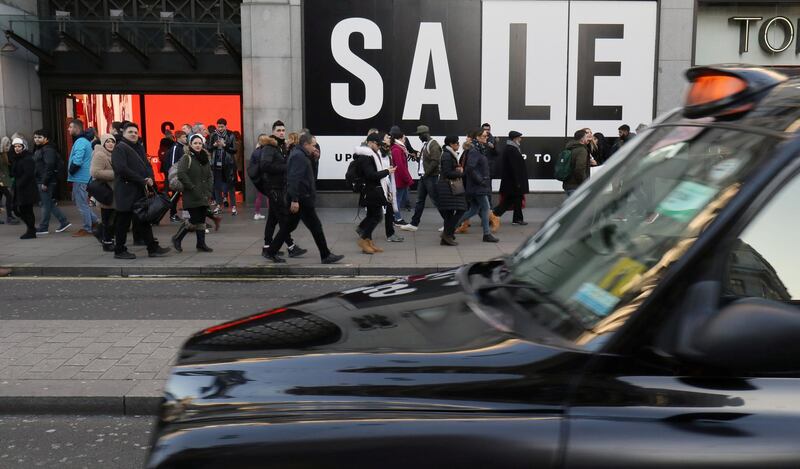British shoppers curbed their shopping over Christmas, rounding off the worst year for UK spending since 2012, a new survey showed on Monday.
Visa’s consumer spendiNg index fell by 1 per cent annually in December, the crucial Christmas shopping period for stores, as surging inflation led households to tighten their purse strings.
Inflation shot up following the Brexit vote in June 2016 as the collapse in sterling pushed up the cost of imports. The UK's Consumer Prices Index inflation rate – the key measure of inflation – was 3.1 per cent in November, the highest in almost six years. Meanwhile, average weekly wages are growing at just 2.3 per cent according to the most recent data, resulting in a "squeeze" on household incomes.
Consumer spending slipped 0.3 per cent for 2017 as a whole, marking the first year-on-year fall in five years.
Visa, whose debit and credit cards are used for a third of UK payments, warned that spending is unlikely to recover in 2018.
“Christmas rounded off a lean year for retailers, with consumer spending seeing its first consistent 12-month decline since 2012,” said Mark Antipof, Visa’s chief commercial officer.
“This result has bucked the trend of the previous four years which saw annual consumer spending rise by an average of 1.7 per cent.”
Inflation pressure will ease slightly this year, the company said, but a full recovery is unlikely thanks to broader problems of weak wage growth and Brexit uncertainty.
The release of the data came as a range of high street retailers reported sluggish trading over the Christmas season and warned of continued difficult conditions in the new year.
________________
Read more:
[ New car sales in the UK register biggest decline since 2009 ]
UK's turbulent year draws to a close with little to cheer
________________
On Monday, British baby goods retailer Mothercare cut its full-year profit forecast after it saw a big fall in sales over the key festive period.
The firm said like-for-like sales fell 7.2 per cent year-on-year, while online sales dropped by 6.9 per cent.
Visa now expects adjusted group profit for the year ending March to be between £1 million (Dh4.97m) and £5m, substantially lower than previous estimates of £10m.
Last week, department store Debenhams also warned on profits following dismal Christmas sales, sending the shares down to the lowest level since the 2008 financial crisis.
Meanwhile, rival chain House of Fraser, which is due to reveal Christmas trading figures this week, has confirmed that it has written to landlords seeking to reduce rents on some stores.
The move, which echoes actions taken by fellow retailer BHS just before it went bust in 2016, has sparked concerns for House of Fraser’s financial health, as it struggles to revive high street sales.
Taken as a whole, spending on the high street saw an annual fall of 2.7 per cent in December, according to Visa, while online spending slowed to an annual 2 per cent, from 2.4 per cent in November.
“Household purchasing power is being continually eroded,” said Annabel Fiddes, principal economist at IHS Markit, which compiled the Visa index.
“Meanwhile, consumer confidence remains relatively muted amid uncertainties over the strength of the UK economy and the ongoing Brexit negotiations. It seems unlikely that expenditure will bounce back to the levels of growth seen in 2016 anytime soon.”
Separately, a Deloitte survey showed that leading businesses are also planning to tighten their belts over 2018 as worries about Brexit weigh on investment.
The survey of more than 100 of Britain’s top chief financial officers showed that Brexit was their biggest concern in the fourth quarter of last year, and is seen to pose a growing risk to business.
Around 75 per cent also expect it to lead to a worsening of conditions in the long term, up from 60 per cent in the third quarter.
CFOs also reported the biggest focus on cost control in eight years, despite a robust global economy.
Risk appetite – a proxy for big companies’ willingness to invest – was a shade weaker than three months ago and well below levels seen before the Brexit vote.
The survey was carried out in early December, and included the views of 112 CFOs, whose companies represent about a fifth of Britain’s publicly traded corporate sector by value.






